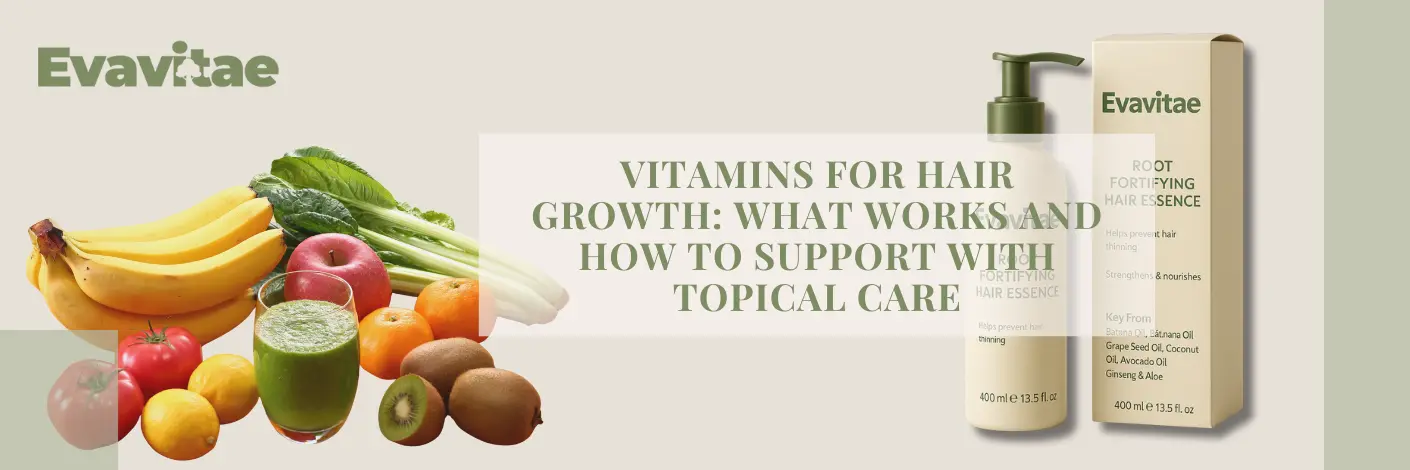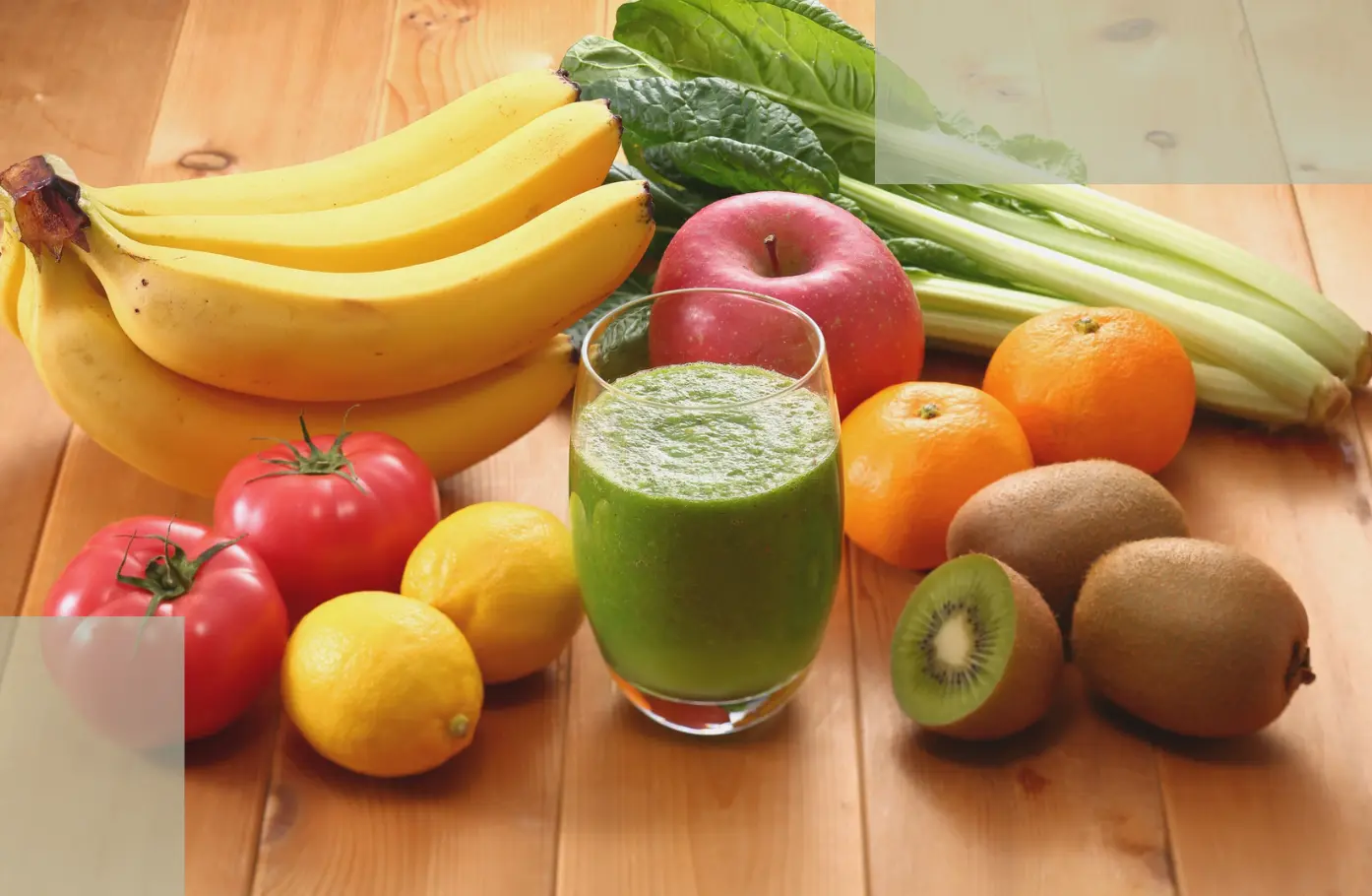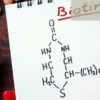Hair growth is a complex biological process influenced by genetics, hormones, overall health — and yes, nutrition. If you’ve been noticing thinning, shedding, or a general lack of luster in your hair, one of the first things to evaluate is whether your body is getting the right vitamins and minerals.
In this guide, we’ll walk through the most important vitamins for hair growth, what deficiencies to look out for, and how to support your scalp not just through diet — but with gentle topical care designed for sensitive skin.
🌿 Why Vitamins Matter for Hair Growth
🧠 The Most Important Vitamins for Hair Growth
Let’s break down the vitamins and minerals that play a central role in supporting hair health:
1️⃣ Biotin (Vitamin B7)
Perhaps the most famous “hair vitamin,” biotin plays a key role in the production of keratin — the protein that makes up hair, skin, and nails.
- Deficiency signs: Hair thinning, brittle nails, dry skin
- Food sources: Eggs, almonds, spinach, sweet potatoes
- What research says: Biotin deficiency is rare, but supplementation has shown promise in people who are deficient or have brittle hair and nails.
📚 Journal of Clinical & Aesthetic Dermatology
2️⃣ Iron
Iron helps carry oxygen to cells, including hair follicles. Without enough oxygen, follicles can weaken or shift prematurely into the shedding phase.
- Deficiency signs: Fatigue, pale skin, increased hair shedding
- Food sources: Red meat, lentils, spinach, fortified cereals
- Note: Iron deficiency is particularly common in menstruating women.
📚 Harvard Health Publishing
3️⃣ Vitamin D
Vitamin D influences the hair growth cycle, especially the anagen (growth) phase. Low levels have been linked to alopecia areata and other hair loss conditions.
- Deficiency signs: Fatigue, low immunity, thinning hair
- Sources: Sunlight, fortified dairy, salmon, supplements
📚 Cleveland Clinic
4️⃣ Zinc
Zinc contributes to tissue repair and proper function of oil glands around follicles. Deficiency can disrupt the hair cycle and even lead to scalp inflammation.
- Deficiency signs: Hair loss, flaky scalp, poor wound healing
- Food sources: Pumpkin seeds, oysters, cashews, chickpeas
5️⃣ Vitamin A (in moderation)
Vitamin A helps skin glands produce sebum — the natural oil that moisturizes the scalp and supports hair health. But be careful: excessive intake can cause hair loss.
- Food sources: Carrots, sweet potatoes, spinach, liver
- Best tip: Get it from food, not megadose supplements
6️⃣ Protein (yes, it’s vital too)
Hair is primarily made of keratin, a protein. A low-protein diet can halt hair growth and lead to increased shedding.
- Sources: Chicken, fish, legumes, tofu, quinoa
For readers interested in how dietary choices and scalp care routines work together, our guide on foods that stimulate hair growth explains how balanced nutrition supports the effects of topical treatments and helps restore hair from within.
If you’re curious about how prenatal supplements fit into the bigger picture of nutrient-based hair care, take a look at this detailed discussion on prenatal vitamins and their link to stronger, healthier hair growth.
🧴 Why Topical Care Still Matters
Even with the best diet, hair care is incomplete without treating your scalp like skin — because that’s exactly what it is. The scalp is the environment in which your hair grows. If it’s irritated, inflamed, or clogged, no amount of biotin can save your strands.
That’s where gentle, topical support comes in.
🌸 Supporting Hair Growth from the Outside In
✅ 1. Use Sulfate-Free, Fragrance-Free Shampoo
Sulfates and synthetic fragrances may dry out and irritate the scalp, especially if it’s already sensitive due to hormonal shifts or vitamin deficiencies.
Choose formulas that cleanse without stripping natural oils and help soothe the scalp barrier.
🧴 Look for products with:
- Biotin
- Amino acids
- Panthenol (pro-vitamin B5)
📚 Learn more: American Academy of Dermatology
🌿 Support your hair’s natural growth with gentle, science-backed care — explore the Evavitae Root Fortifying Hair Essence.
✅ 2. Apply a Lightweight, Nourishing Serum
Topical serums with ingredients like vitamin E, plant oils, and peptides can provide antioxidant protection and hydration — especially useful when hair feels dry or fragile.
For best results, apply to a clean scalp or damp hair ends 2–3 times per week.
✅ 3. Be Gentle with Styling
Even the best nutrients can’t prevent damage from:
- High heat styling tools
- Tight ponytails or buns
- Rough brushing
Try air-drying, use silk scrunchies, and detangle gently with wide-tooth combs.
🥗 Best Practices for Hair-Healthy Nutrition
Eating “for your hair” doesn’t mean radical diets or supplements. Instead:
- Focus on whole foods rich in iron, protein, vitamin D, and biotin
- Avoid crash dieting — rapid weight loss can trigger telogen effluvium (diffuse shedding)
- Drink plenty of water — hydration matters
- Consult a doctor before starting high-dose supplements
❓ FAQs About Hair Growth Vitamins
Q: Should I take biotin if I’m not deficient?
There’s no harm in small doses, but excess doesn’t boost growth. If your levels are fine, focus on topical care instead.
Q: Can I use topical vitamins instead of oral ones?
Topical and oral serve different functions — ideally, they work together.
Q: How long until I see results?
Hair growth is slow. Expect 2–3 months of consistent care before noticing changes.
🔎 Summary Table
Concern | Recommended Vitamin | Topical Support Tip |
Thinning hair | Biotin, Vitamin D | |
Dry, brittle strands | Zinc, Protein | |
Scalp irritation | Vitamin A (moderate) | Fragrance-free, soothing haircare |
Slow regrowth | Iron, Vitamin D | Gentle scalp massage, avoid tight styles |
💛 Final Thoughts
The road to healthier hair isn’t about a miracle vitamin — it’s about consistency and balance. Making sure your body has the right internal nutrients while caring for your scalp externally is a powerful, long-term approach.
Eat well. Be kind to your scalp. Avoid harsh products.
Hair doesn’t change overnight — but with time and thoughtful care, it can absolutely thrive.
🌿 Looking to continue your journey toward stronger, fuller hair? Discover more tips in our Hair Growth Hub.
For a broader, evidence-based overview beyond men-specific picks, explore our guide to
vitamins for hair growth and how to support with topical care. It shows how to pair internal nutrition with gentle, scalp-friendly routines for better long-term results.
Get the full roadmap to postpartum hair regrowth inside our Postpartum Hair Care and Recovery Guide.
📚 References (APA Style)
- Cleveland Clinic. (2022). The connection between vitamin D and your hair. https://health.clevelandclinic.org/the-connection-between-vitamin-d-and-your-hair/
- Harvard Health Publishing. (2021). Iron deficiency and hair loss. https://www.health.harvard.edu/staying-healthy/iron-deficiency
- Journal of Clinical and Aesthetic Dermatology. (2017). A review of biotin use in hair loss. https://www.ncbi.nlm.nih.gov/pmc/articles/PMC5582478/
- American Academy of Dermatology. (2023). Hair loss: Biotin supplements. https://www.aad.org/public/everyday-care/hair-scalp-care/hair-loss/biotin-supplements
Evavitae products are now available exclusively at www.evavitae.com.





Add comment
You must be logged in to post a comment.